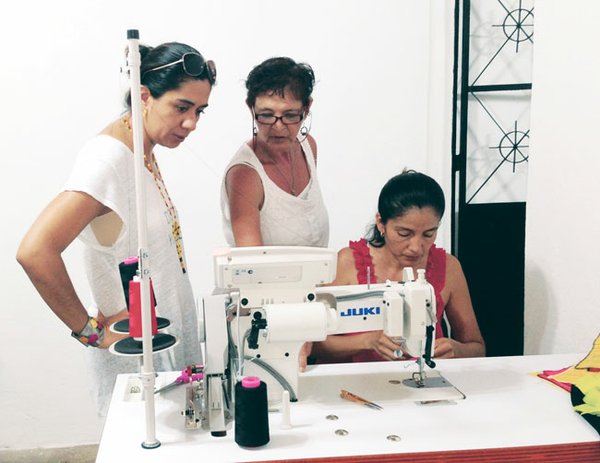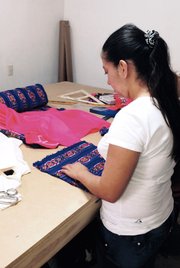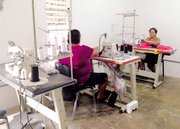Quality Skills Center in Higuera Blanca, Mexico, trains apparel workers through a paid apprenticeship program, then hires the workers to produce apparel made from traditional Guatemalan- and Mexican-made textiles.
THE QUALITY SKILLS CENTER
Artisan-Driven Boutique Production in Coastal Mexico
It was never Amber Sellers’ dream to have her own accessories and apparel factory—until she discovered what she could do with it.
“I personally have two missions: The first is to help people, the second is to make beautiful things,” said Sellers, founder of Quality Skills Center in Higuera Blanca, Mexico. “My priority is to keep these artisans and apprentices of Quality Skills Center working.”
There are a myriad of things that can go wrong in the production chain, and Sellers has dealt with nearly all of them. She started her career in fashion assisting high-profile stylist Andrew Richardson in New York. Every day was a hunt to obtain garments by any means necessary for photo shoots or to unearth the exact right vintage pieces that the creative director desired. Her talent for figuring it out brought her to Los Angeles, where she was hired by a luxury T-shirt brand in start-up mode expanding into a full collection.
“I kept watching deadlines come and go without anyone accepting responsibility, and I thought, ‘There has to be a better way,’” Sellers said. “I was shocked by the lack of accountability. The dyehouse blamed the delay on the fabric vendor. The sewer blamed it on the cutter and on and on.”
After cutting her teeth learning the ins and outs of Los Angeles manufacturing, she went on to become a production manager for Planet Blue’s Blue Life label, then at a factory that made private-label apparel for fast-fashion companies. But it was the goodwill work that she was doing with her father, Pat Sellers, that inspired her to produce differently.
Now a Kentucky-based retired naval officer, Pat Sellers dedicates his spare time to various philanthropy projects. One such project was partnering with a local woman in Antigua, Guatemala, to help artisans make an honest living from their handicrafts. Through the mentoring partnership, they established a brand built on the beauty of traditional Guatemalan textiles with a stylish spin. Amber Sellers designed and strategically placed the product in fashion boutiques. A percentage of each sale went into the Helping Hands zero-percent-interest micro-loan program, which offered the workers capital to invest in their own ambitions.
When it came time for Amber Sellers to open the doors of her own factory, Quality Skills Center, she applied many of the same business practices she learned from her father and added further steps.
“The combination of a production facility and a skills center is a powerful tool for self improvement and professional advancement. It’s amazing to watch the workers’ confidence grow every day,” Sellers said. The skills center offers paid apprenticeships and training. Once sewers have mastered the sewing skills, their income rises corresponding with their skill level. Amber Sellers' experience sourcing traditional Guatemalan and Mexican-made textiles has won over boho-inclined boutique labels in Los Angeles, as well as L.A. contemporary brands seeking small production runs. QSC also makes apparel for shops in the neighboring tourist beach town of Sayulita, Mexico.
Amber Sellers chose the location because of its proximity to the trendy surf village, which relies on tourist dollars. During the low season of June through October, most of the workers are laid off from their service-industry jobs. “During high season most of the waiters and cooks and concierges are men, leaving the women with limited options of housekeeping and store clerks—for those fortunate enough to have been taught English somewhere along the way,” said Amber Sellers, who often visited the neighboring beach town Punta Mita on vacation
“Apparel production happens all year. We provided a sense of security to our workers. Sourcing production closer to home also results in shorter lead times, and our clients have the option of ground transportation as opposed to slow boats and expensive air freight companies,” she continued. Shipping from Mexico to the USA is duty-free under NAFTA.
Amber Sellers makes her factory attractive to new fashion risk-takers by not enforcing minimums. “It’s always been heartbreaking for me to watch a designer slave over their design, spend the money for the development and then have to cancel the style because they didn’t meet the minimum in sales required for cost-effective manufacturing,” Sellers said. “There’s no way for them to recoup the cost of the sourcing, pattern making and sample-making fees. Most LA factories consider anything less than 50 units to be sampling, which doubles the production cost of cut-and-sew.”
The Quality Skills Center approach reflects a changing tide among the millennial generation. Younger companies and consumers care about accountability and transparency when it comes to the foods they eat and products they buy. Brands started in California—including Krochet Kids, 31 Bits and Our Hands for Hope—established their businesses based on helping women rise above poverty in Uganda and Peru. In many cases, the brands offer a paid apprenticeship to learn the trade and also utilized the ancestral talents of the local women—for example, Peru’s rich history of textile weaving and knitting.
“Our clients are investing in their own brand by working with us, and they are investing in the future of our employees helping them to help themselves and contributing to the success of our apprenticeship program,” Sellers said.
For more information, visit www.qualityskillscenter.com.
























